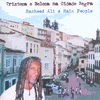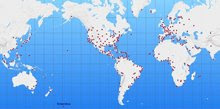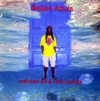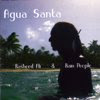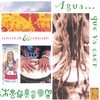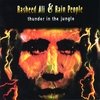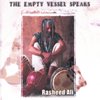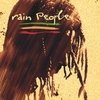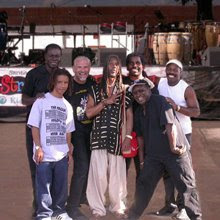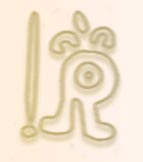Friday, November 28, 2008
Friday, November 21, 2008
Dia da Consciência Negra em Brasil!

Today, November 20Th, is the National Day of Black Consciousness in Brasil.
For millions of Brasilians this is a day of great pride, a day of black awareness (consciência negra) in the nation that held the most enslaved Africans in the Americas, where legal slavery lasted until 1888.
It is the day, in 1695, when Rei Zumbi dos Palmares was captured and beheaded by the Portuguese military for leading the greatest Maroon colony (Quilombo) of escaped Africans in the Americas. One hundred and ninety-three years before the abolition of slavery in Brasil, the barbarous Portuguese took Zumbi's head and displayed it in the city of Recife 's main plaza so that enslaved Africans would know that he was not immortal. Still, they could not kill his legend nor the legacy of the Palmares settlement over which he ruled at the time of his death.
Founded sometime in 1630, during the war between the Dutch and the Portuguese, the maroon settlements in the highlands of of Alagoas proved to be a place of sanctuary for many enslaved Africans who took advantage of the confusion of war to escape. Among them was a man from Angola who is now known by the honored title of Nganga Zumba. As head of the council of villages which became known as Palmares or Angola Janga (New Angola), Nganga Zumba was regarded as the patriarch or king of the settlement. By 1670, the community had grown into a small nation-state of approximately 30,000. The quilombo had to stave off many attacks by the Portuguese army but in 1678 Nganga Zumba, tired of the constant warfare, accepted a peace treaty that required that they relocate. His acceptance of the treaty caused a split among the community and led to Nganga Zumba being poisoned. Those who accepted the treaty and relocated were summarily re-enslaved! Nganga Zumba's nephew, Zumbi, had opposed the treaty and he was taken as king by those who decided to stay in Palmares. Zumbi valiantly led the quilombo of Angola Janga for fifteen years against Portuguese attacks until he was defeated in 1694. Forced into hiding and wounded after the defeat, Zumbi continued to fight as an insurgent against the Portuguese for nearly two years until his hideout was betrayed.
"One Tribe, Many Voices" Podcast Episode 26











Intro: Hino de Saudacao / Filhos de Gandhi /Afoxe Filhos de Gandhi
Samba de Senzala / Irmandade do Rosario / Batuques do Sudeste
Brasume / Nacao Ere / Maracatu Atomico
Lleva'me / Rasheed Ali & Rain People / Agua Santa
- Luanda, Luanda / Nacao ere / Maracatu Atomico
- Rei Zumbi dos Palmares / Capoeira de Angola
- Os Tambores de Minas / Milton Nascimento / Nascimento
- Oracao pra Ya Oxum / Raimundo Sodre & Jota Veloso / Qual E da Musica?
- Um Canto de Afoxe pra o Bloco de Ile / Caetano Veloso /Beleza Tropical
- Tambores da Liberdade / Rasheed Ali & Rain People / Tristeza e Beleza
- Cade o Timbau? / Timbalada / Cada Cabeca e um Mundo
- Malie, Um Canto de Fe por um Mundo Melhor / Ile Aiye / Canto Negro
- Lua Male / Mali Debale /Qual E da Musica?
- Berimbau / Olodum / 20 yrs da Musica do Olodum
- Na Cidade Negra / Rasheed Ali & Rain People / Tristeza e Beleza
- Ilu Aiye / Minha Querida Portela / Sambas de Terreiro 1972
- Tanacara / Gonzaguinha / E
- Voce esta na Bahia / Rasheed Ali & Rain People / Tristeza e Beleza
- Quilombo / Gilberto Gil / Beleza Tropical
The truth about the African Diaspora!

What does the Rain People motto: "One Tribe, Many Voices"
really mean?
Who is the African Diaspora and what do we have to say?
Anglo-centric Black American people of the African Diaspora never give much thought to the fact that the majority of Africans do not speak English as their primary language.
Nor do they realize that the majority of Africans in Africa are multi-lingual; speak their own ethnic language and the languages of their neighbors as well as the language of the former colonizers.
There are an estimated 2,000 languages spoken on the African continent and millions speak Portuguese, Spanish, French, Dutch, Arabic and Italian.
I think it is fair to say that Africans have many voices and if you want to hear what Africans have to say; you must take time to learn another language!
Monday, November 17, 2008
Wednesday, November 12, 2008
"One Tribe, Many Voices" Podcast Episode 25












Intro: “Ancestors, Ancestors” / Rasheed Ali /
Music for “The Cloud Gatherer”
Molho Do Reppolho / Pepeu e Moraes / Live in Japan
Rhythm Runner / Flora Purim / Speed of Light
- Voices in the Wind / Rasheed Ali / The Empty Vessel Speaks
- Mohunga / Aka Pygmies / African Rhythms
- Sonhos / Rasheed Ali & Rain People / Beijos Azuis
- Toques / Capoeira de Angola de Salvador
- N’Zambi / Andre Mingas / Telling Stories to the Seas
- Mama Kiyelele / Ricardo Lemvo & Makina Loca / Tata Masamba
- Ojala / Rasheed Ali & Rain People / Agua que va a Caer
- Llévatelo Todo / Tego Calderon / El Subestimado
- Alech Taadi / Cheb Khaled / N’ssi N’ssi
- Yaye Boy / Africando / African Salsa
- La Isla Invisible / Rasheed Ali & Rain People / Agua que va a Caer
If You enjoy the One Tribe, Many Voices Podcast, it's free and easy to become a subscriber!

Monday, November 10, 2008
Mama Africa (1932-2008)

Today, Africa and the African Diaspora mourns the death of the legendary South African singing star Miriam Makeba.
When I was a child I knew of Miriam Makeba because she and Nigerian drum master Olatunji were two African music stars that were revered by my mother and father. For many years she was the most famous African woman in the world. In 1966 she became the first African woman to win a Grammy award. She was a true pioneer for African musicians gaining world recognition.
She never failed to speak truth to the powerful and because of her outspoken ways she paid a high price. She was exiled from South Africa for 31 years after appearing in the 1959 film; "Come back Africa", an anti-apartheid film that was smuggled out of South Africa. In 1963 she spoke out against apartheid at the United Nations General Assembly. American record labels dropped her and she couldn't get concert bookings after she became engaged to Trinidadian-American political firebrand Stokely Carmichael in 1968. President Sekou Toure of Guinea gave the activist couple a home in his country and rescued Makeba's career.
She did not return to South Africa until she was urged to return home by Nelson Mandela in 1990.
She will always be remembered for the song: "Pata, Pata".
Sunday, November 09, 2008
Television Without Borders!


I greatly encourage "One Tribe, Many Voices" listeners to support LinkTV.Org
I am sure that you will find this media portal to be as interesting as I do!
Saturday, November 08, 2008
"One Tribe, Many Voices" Podcast Episode 24







Intro: Tatenda Mambo / Rasheed Ali / Music from the Cloud Gatherer
1- Move on Up / Curtis Mayfield / The Very Best of Curtis Mayfield
2- Thunder in the Jungle / Rasheed Ali & Rain People
3- Sube / Eddie Palmieri / El Rumbero del Piano
4- Pan Rising / Phase 11 Pan Grrove / Pan Woman
5- O que Eu Quero e Sambar / Portela / Sambas de Terreiro
6- Vuela la Paloma / Conjunto Rumbavana / Sabroso! Havana Hits
7- Rock de Party / Bert "Panta" Brown / Soca Trinity
8- Coracao em Festa / Jair Rodrigues / Brasil Compilation
9- Una Cucharita / Rasheed Ali & Rain People / Unreleased
10-Clear de Way / Benjai Scarface / Soca Invasion
11- Blaze de Fire / Bunji Garlin / Soca Invasion
12- Break Away / Fayann Lyons / Soca Invasion
13- Pan Woman / Exodus Steel Orchestra / Pan Woman
Listen to the "One Tribe, Many Voices Podcast.
Wednesday, November 05, 2008
An historic event gives pause for reflection.

Yesterday morning, November 4Th, 2008, I awoke early with the knowledge that the election polls would open at 7am here in California. I drank my coffee in record time and I made it to my local election polling place by 7:30am. There was already a line of anxious United States citizens assembled. When it was my turn to enter the voting cubicle, I called for assistance because I was new to the process. I had never voted in an American election. I had never felt compelled to be involved in the process of selecting anyone for presidency of the United States. I was one of those jaded residents of this country who did not feel represented nor did I care. After all, I was only a hyphenated American: Caribbean-American, African-American, Latino-American, West Indian-American....but certainly not simply "an American".
I never felt that America was a place of permanence for me. I felt I was only here on borrowed time, to become successful and return home to the Caribbean like my parents did. I thought that voting was something for the 'real Americans', for the 'Yankee People'. As a musician and as an educator, who has spent years teaching and inspiring vulnerable children, the arc of my life can be described by the definition of 'social activist'. Still, I chose to do my part within an apolitical context.
Many Caribbean people have been activist from the moment we arrived here. Black pride or pride in our African roots was never something to be ashamed of, we had no choice! Our music and our food and our outlook was and is very different from that of "regular Americans". When we first arrived here in numbers, we changed the landscape of racial pride in New York City and we helped to fuel the Harlem Renaissance with a new breed of intellectuals. We simply had no choice but to bring our true selves and our true outlook. Yes, we were Black and Brown people but we didn't come here to "mind our place" and pay heed to America's racial traditions. We brought a new viewpoint embodied in immigrant arrivals and first-generation Caribbean intellectuals and political leaders like Arturo Schomberg, J.A. Rodgers, Claude McKay, Malcolm X, Shirley Chisholm, Stokely Carmichael, Charles Rangel and even Louis Farrakhan.
In fact, it was NY congresswoman Shirley Chisholm who was the first African-American major party candidate for the presidency of the United States in 1972.
Barack Obama gave me a reason to be involved in a way that I never thought necessary. I donated money to a political campaign. I attended a local Obama organizing event. I sent e-mails and I told everyone who would listen, including the readers of this blog, that he was a uniquely positioned individual who could make a difference on the world stage.
As a student of history, who had listened to the great Dr. John Henrik-Clarke speak at a lecture hall in Hunter College, I shed tears for all of our African people who died before this day of redemption. Barack Obama led me past my own jaded view of America to a feeling of urgency that I should finally participate fully in the American dream. I am still a hyphenated American but I am one who voted for Barack Obama for president of the United Sates!
Yesterday, my oldest son, Kareem also voted for the first time in his young life but he already has reason to believe in America's "better angels".
I witnessed the birth of both of my sons, Kareem and Rohan, but last night I witnessed the birth of America's future. Born of a tortured past and the audacity of hope, Barack Obama emerged not as a child but a man.
